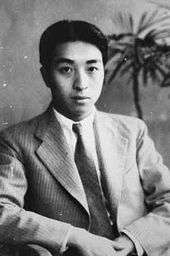Chen Gexin

Chen Gexin (Chinese: 陳歌辛; pinyin: Chén Gēxīn; Wade–Giles: Ch'en Ko-hsin; 1914–1961) was a Chinese popular music songwriter. His also used the pen names Lín Méi (林枚) and Qìng Yú (慶餘).
Biography

Chen was born into an elite Shanghai family, and his maternal grandfather was from India. During the Second Sino-Japanese War, he was jailed by the Imperial Japanese Army for his patriotic songs.
With the Communist seizure of power in China in 1949, popular music was considered ideologically suspect[1] and Chen was labeled a rightist and imprisoned in a laogai for "reform through labor" in 1957. He died soon after at the age of 47.
Chen Gexin was the father, with his muse Jin Jiaoli (金嬌麗), of Chinese classical composer Chen Gang (陳剛 Chén Gāng) and grandfather of China's first "Miss Internet," Chen Fanhong.[2]
Music
Chen was the composer of famous mid-20th century popular standards as Shanghai Nights (夜上海) and The Blossom of Youth (花樣年華), both sung by Zhou Xuan. His song Rose, Rose, I Love You, sung by American singer Frankie Laine in 1951, is the only major popular music hit in the United States by a Chinese composer. When Chen's youngest son went to the United States for advanced education, he was able to meet Laine and thereafter maintained a correspondence. Another of his songs, Wishing You Happiness and Prosperity, originally written to celebrate the end of the Second Sino-Japanese War, has become a popular Chinese New Year standard. His music continues to be performed and is featured in films such as Eros.
Notes
- ↑ "Panorama of Musical Creation: Vocal Music" at China Culture Information Net
- ↑ "Handicapped Miss Internet blasts mag" Archived September 25, 2006, at the Wayback Machine. at Enablenet - News